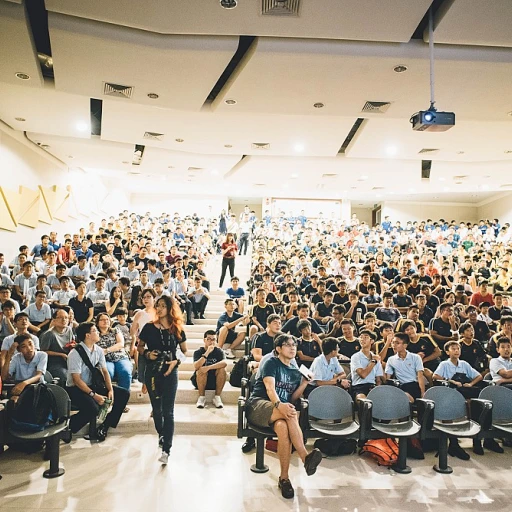
Understanding the Importance of Right Sourcing
The Significance of Optimal Candidate Attraction
In the competitive landscape of talent acquisition, understanding the significance of optimal candidate attraction is more pressing than ever. This foundational step serves as a catalyst for several components in the recruitment lifecycle, from business innovation in staffing models to employment satisfaction.
Organizations that emphasize rightsourcing and strategic workforce programs often report significant cost savings and enhanced service quality. By optimizing candidate attraction, businesses can better align their workforce with long-term goals, ensuring both the stability of their contingent workforce and the potential for growth. The concept of rightsourcing or "right source" involves evaluating whether insourcing or outsourcing is the best fit for a company while considering factors like contingent management, service provider capabilities, and workforce flexibility.
One critical element enabling effective candidate attraction is the integration of a vendor management system (VMS) and aggregated talent analytics through tools like the VMS peak matrix. This helps in providing a consolidated view of the contingent workforce, aligning recruitment strategies with business objectives, and ensuring compliance with complex legal and privacy policies. Organizations can also learn from the guidelines set forth by the Everest Group's peak matrix assessment to benchmark their hiring processes against best practices, achieving a competitive edge.
Moreover, aligning candidate attraction strategies with a strong employer brand enhances a company's ability to draw in top-tier talent. When a company is recognized for its robust managed service offerings and a commitment to employee wellbeing, it has a greater pull in attracting professionals who are not only skilled but also aligned with the company's values.
The importance of optimal candidate attraction cannot be overstated; it is vital for shaping an engaged and proactive workforce. With industries like healthcare and technology seeing a dramatic increase in demand for skills, businesses must leverage strategic candidate attraction as a means of securing the talent necessary for continued success.
Identifying Key Challenges in Candidate Sourcing
The Intricacies of Candidate Sourcing Challenges
Understanding and overcoming the challenges inherent in candidate sourcing is foundational to refining your approach and ensuring optimal results. While candidate sourcing can be a rewarding aspect of talent acquisition, it comes with its fair share of complexities that recruitment professionals must navigate. Firstly, the ever-evolving workforce landscape presents a major challenge. As the contingent workforce grows, sourcing professionals must adapt to a dynamic labor market where traditional strategies often fall short. Sourcing the right talent—be it through insourcing, outsourcing, or rightsourcing—demands an innovative touch and an adaptable mindset. Furthermore, finding candidates with specialized skills, especially in sectors like healthcare and tech, can be like searching for a needle in a haystack. With the talent pool for niche jobs often being limited, recruiters must develop strategies that are both targeted and inclusive. The rise of a vendor management system (VMS) and managed services has helped streamline this process, but understanding how to harness them effectively remains crucial. Cost management is another pivotal concern. Direct sourcing can yield significant cost savings but without a well-planned strategy, expenses can quickly spiral out of control. Effective use of vendor-neutral strategies and extensive management systems can help keep costs in check while maximizing the sourcing effort’s efficiency. Legal and privacy policy considerations also loom large in candidate sourcing. Staying compliant with legal regulations and ensuring data privacy can pose hurdles that, if not addressed, impact a company's reputation and operations. It’s essential to have a clear understanding of the legal landscape to ensure smooth, uninterrupted sourcing operations. Lastly, the metrics to measure sourcing success can be elusive. Though reports and assessments like the VMS Peak Matrix by the Everest Group offer insights, it's often challenging to align them with individual company goals and service provider evaluations. Establishing a robust matrix for talent management allows businesses to track progress and share insights that lead to a more informed strategy. Addressing these hurdles not only requires a thorough understanding of the current candidate sourcing environment but also a strategic approach that combines traditional and innovative methods. To dive deeper into understanding how interim management can complement your sourcing strategy, consider exploring this comprehensive guide.Strategies for Effective Candidate Sourcing
Adopting Strategic Approaches
Effectively sourcing candidates for your business requires strategic planning. It's essential to adopt a mindset that not only captures talent but does so in a cost-efficient manner. As the corporate landscape becomes more global, the approaches to services and contingent workforce management must evolve. Here's how you can enhance your sourcing strategy:- Rightsourcing for Business Needs: Understanding the essence of rightsourcing involves evaluating whether insourcing, outsourcing, or a mix of both aligns best with your business objectives. This assessment helps in creating a flexible contingent workforce capable of meeting peak demands efficiently.
- Building Partnerships with Managed Service Providers: A managed service approach can simplify the complex landscape of vendor management. Managed service providers, such as rightsourcing magnit, ensure that your company leverages the right talent at competitive costs, maximizing efficiency.
- Direct Sourcing Initiatives: A focus on direct sourcing can bring significant cost savings and improve the talent acquisition cycle. This approach necessitates a clear understanding of your workforce program, whether managed internally or externally.
- Integrating Technology in Sourcing Processes: Utilizing a vendor management system (VMS) enhances the capability to track, measure, and optimize the sourcing strategy effectively. Tools falling under the VMS peak category, as recognized by research entities like the Everest Group, offer robust solutions for better workforce management.
Leveraging Technology in Sourcing
Harnessing the Power of Technology for Candidate Sourcing
In the ever-evolving landscape of candidate sourcing, leveraging technology has become a pivotal element toward enhancing recruitment processes. The integration of robust tools like vendor management systems (VMS) and managed service providers opens new avenues for optimizing sourcing efforts, promoting both time and cost savings. The utilization of vendor management systems allows businesses to streamline their staffing operations, providing seamless access to a contingent workforce. This system not only enhances compliance but ensures that rightsourcing with entities like Rightsourcing Magnit is effectively managed. Moreover, VMS peak solutions assist in controlling costs, maintaining a vendor-neutral environment, and supporting better resource management. When considering direct sourcing, technology plays a significant role in facilitating services that provide a competitive edge. By harnessing data from platforms such as the Everest Group Peak Matrix analysis, organizations can gain insights into effective management systems that support talent acquisition strategies and legal compliance in the workplace. Integrating a managed service provider helps to share the burden of complex recruitment needs, allowing recruitment agencies to focus on delivering superior candidate options. This model aligns well with both insourcing and outsourcing strategies, depending on a company’s unique requirements. With the ability to generate comprehensive workforce reports, businesses can review their recruitment strategies and make adjustments as needed to adhere to their privacy policy and other legalities. In the competitive healthcare sector, where services and talent acquisition are crucial, leveraging technology in sourcing processes becomes even more critical. By adopting advanced tools, healthcare organizations can ensure they remain compliant while also tailoring their sourcing strategy to align with broader business objectives. For organizations looking to capitalize on these technological benefits, it is paramount to ensure that their software solutions remain updated and aligned with industry best practices. This active management guarantees the recruitment process remains efficient, compliant, and in harmony with the company's overarching recruitment strategy.Building a Strong Employer Brand
Crafting a Compelling Employer Image
In today's competitive job market, it's not just about finding candidates—it's about attracting them to your organization. Building a strong employer brand is essential in the landscape of contingent workforce management and direct sourcing. Your brand is the perception candidates have of your company, influenced by your workforce program, culture, and values. A positive employer brand can vastly improve your rightsourcing efforts, encouraging top-tier talent to consider opportunities with your organization over others.- Understand Your Audience: Just like any marketing strategy, knowing your audience is key. Learn about what potential talent values. Is it flexibility in jobs, a comprehensive contingent workforce strategy, or a culture of innovation? Tailor your brand message to align with these interests.
- Showcase Unique Value Propositions: Your organization must distinguish itself from the competition. This could be through employee testimonials, success stories, or showcasing your company's commitment to legal and ethical business standards—a crucial consideration given the evolving VMS peak landscape and privacy policy requirements.
- Utilize Technology: Modern management systems, like vendor management systems (VMS) and managed service providers, can help streamline this process. They allow you to share consistent, compelling content across multiple platforms while reporting on engagement and insights.
- Leverage Social Media: Social media is a powerful tool to enhance your employer brand. Share authentic content that illustrates your company culture and values. It also serves as an excellent platform to share open positions and showcase your organization's commitment to rightsourcing magnit strategies, therefore appealing to both active and passive job seekers.
- Measure and Adapt: Utilize tools and services to measure the success of your employer brand initiatives. Matrix assessments and reports from insights like the Everest Group's peak matrix can indicate how well your strategies are performing and where you can find potential cost savings.
Measuring Success in Candidate Sourcing
Evaluating the Effectiveness of Sourcing Efforts
In the ever-evolving landscape of candidate sourcing, measuring the success of your efforts is crucial to fine-tuning your strategies and maximizing your talent acquisition return on investment. This aspect becomes even more pertinent when considering the complexities of rightsourcing and leveraging managed services.- Service Quality and Talent Pool Growth: Regularly report and assess the quality of candidates sourced is imperative. Are the candidates not only meeting but exceeding the job requirements? Services should leverage comprehensive assessments, akin to a matrix assessment or vms peak consultations, to gauge recruitment effectiveness, balancing contingent workforce demands with quality outcomes.
- Cost Savings: Effective candidate sourcing should eventually translate into lowering recruitment costs. This can involve collaborating with a vendor neutral partner or utilizing a managed service provider. Companies, especially those in the healthcare sector, reap benefits from evaluating cost-per-hire metrics and return on investment from employing different candidate sourcing strategies.
- Leveraging VMS and Technology: Vendor Management Systems (VMS) and platforms like Rightsourcing Magnit can streamline the recruitment process and offer insights into workforce program efficiencies. Tracking these processes helps in maintaining robust vendor management protocols and ensuring the contingent workforce is managed optimally.
- Compliance and Legal Adherence: An often overlooked but essential aspect of measuring success includes ensuring compliance. Whether you're tapping into insourcing outsourcing strategies or conducting direct sourcing, strict adherence to legal requirements and management systems is necessary. Keeping privacy policies and business regulations in the forefront is vital for maintaining a strong employer brand.
- Stakeholder Feedback and Share Analysis: Collecting feedback from relevant stakeholders allows for continuous improvement. Furthermore, assessing the share of open positions filled through different sourcing channels can offer clarity on which strategies are yielding success.













